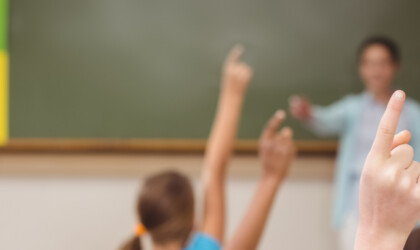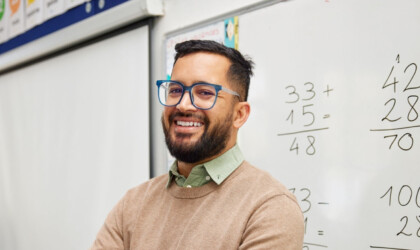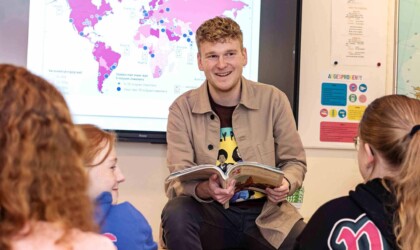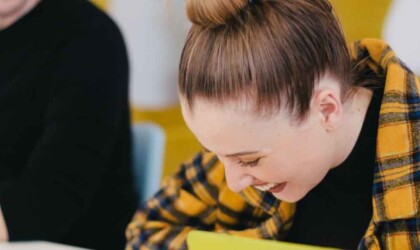The primary task of professionals working with young people is perhaps to provide good guidance and, where necessary, support for the developmental needs of these young people. The main task of primary school teachers is to deliver education to their students.
However, due to Inclusive Education ("Passend Onderwijs"), teachers now face a greater challenge. There is now a group of students in the classroom with more diverse developmental needs. At the same time, there are fewer support (care) staff working in schools, and there is also a teacher shortage.
In short, a lot is being asked of teachers, and increasingly so. Furthermore, the *Evaluation of Inclusive Education Part III* shows that teachers do not always feel adequately equipped to support students with additional needs. There is insufficient interdisciplinarity in teams to provide students with the help they need and to act preventively. Additionally, teachers feel they do not have enough time to collaborate with youth care professionals.
Developmental Needs
Teachers need to be supported in order to continue prioritizing the developmental needs of all students in the classroom and creating a positive and protective environment. To improve collaboration between education and youth care, pedagogues could, for example, be introduced into the team of professionals in primary schools (Van der Grinten & Bomhof, 2020).
Good collaboration between teachers and pedagogues arises from a common goal: to get the best out of students by meeting their developmental needs. Teachers would have the space to focus on the educational needs and cognitive development of students, while pedagogues could support them by focusing on the behavioral and socio-emotional developmental needs of students and the pedagogical climate in the classroom and school. This kind of collaboration between teachers and pedagogues ensures that education and care for young people are more closely aligned. Ultimately, pedagogues can serve as a link between education, families, childcare, and youth care, thereby strengthening the connection between caregivers and all professionals involved with the children. Pedagogues have different expertise than teachers, allowing both professions to complement and enhance each other.
Together with Ellen de Neef and Isabel van Eck, respectively director and team leader at the regional education organization Elevantio in Zeeuws-Vlaanderen, teacher-researchers Marieta Rosendaal – Van den Brande and Rosalina Boer - Wirken of the *Excellence and Innovation in Education* research group at HZ University of Applied Sciences saw possibilities to further investigate the recommendations from the *Evaluation of Inclusive Education Part III* (Van der Grinten & Bomhof, 2020). The aim is to explore how education can better meet the diverse developmental needs of students by organizing education in a new way. This new organizational approach involves introducing higher-education pedagogues into primary schools to work alongside teachers. The research poses the following question: how can pedagogues, together with other professionals in primary schools, form one team that constructively promotes the well-being and development of students?
To answer this research question, the following sub-questions will be investigated:
- In what way is the added value of pedagogues in primary schools visible?
- How can teachers and pedagogues in primary school teams and groups collaborate interdisciplinarily and divide responsibilities?
- How can school leaders successfully lead their interdisciplinary team of pedagogues, teachers, and other professionals?
- How can teachers continue to perform their educational tasks at a high quality when dealing with larger educational units?
- How can pedagogues in primary schools bridge the gap between education, families, childcare, and youth care?
This research has been made possible through the subsidy scheme 'Zeeland in Stroomversnelling' of the Province of Zeeland.
The research is currently in phase 4: the insights gained are being put into practice, and the research is being expanded to other schools, including a secondary school. These insights are presented in the tree diagram below (image 1): the tree symbolizes growth because a higher-education pedagogue in schools is a new concept, and the function/role/place in school will certainly evolve and grow. The core idea is that there is more time and space for children to help them in their development (conversations and guidance) – see the trunk of the tree. The branches and leaves of the tree show the tasks a pedagogue in a primary school can take on. To perform all these tasks effectively, certain conditions must be met, which are depicted in the roots (the foundation).
The research process will result in recommendations for primary schools on how higher-education pedagogues can become a sustainable part of the professional team, ensuring that support for the diverse developmental needs of students remains central. By conducting classroom observations and conversations with students and caregivers, pedagogues gain insight into what is happening with the students and what guidance issues arise. With their pedagogical knowledge, pedagogues can support teachers’ approaches and provide advice on the guidance needs of individual students. With this support, teachers can focus on education and the cognitive development of students.
At the same time, having pedagogues in schools can provide a point of contact for parents with parenting questions. This creates a low-threshold development center for children and families: children attend school, and families have access to a pedagogical branch of a Youth and Family Center at the same location.
Currently, three higher-education pedagogues have already been employed within Elevantio.








